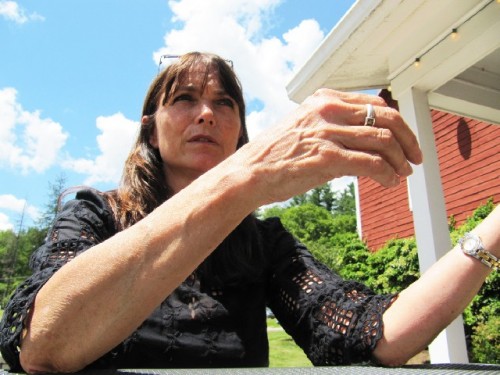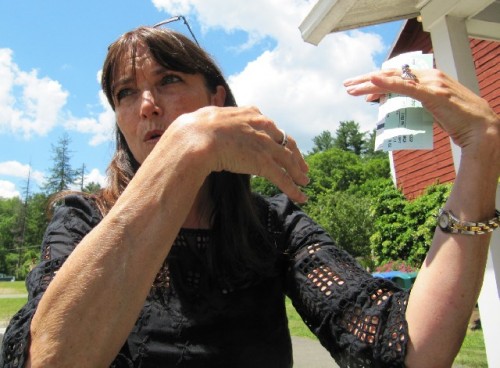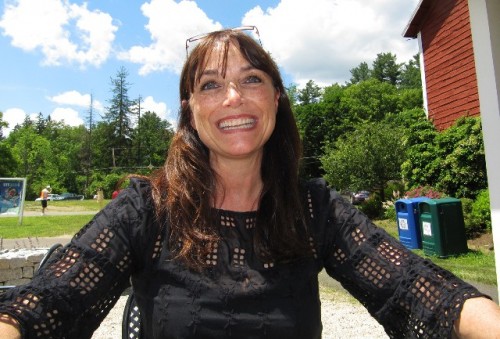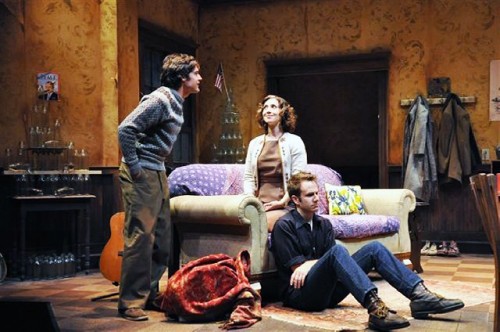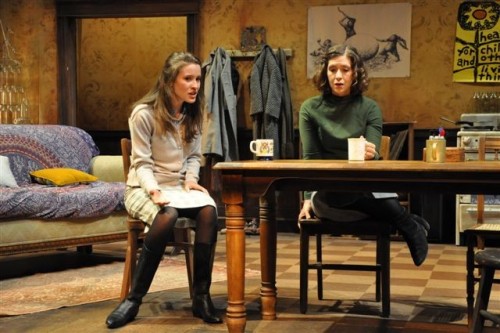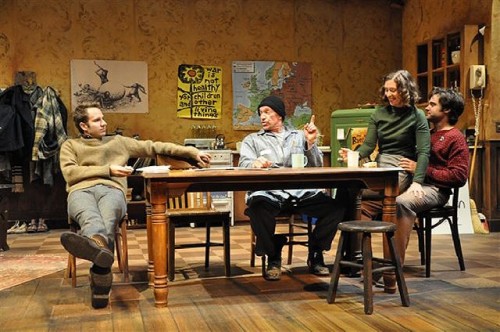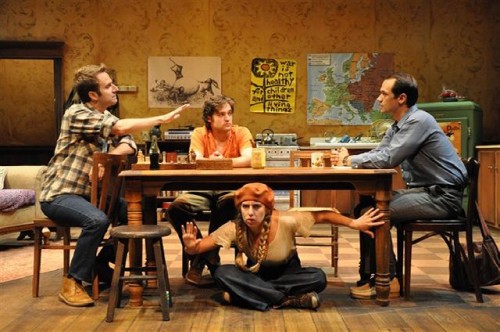Karen Allen Directs Moonchildren
Michael Weller Play at Berkshire Theatre Festival
By: Charles Giuliano - Jul 03, 2011
Moonchildren
By Michael Weller
Directed by Karen Allen
Scenic Designer, John Traub, Costume Designer, George Veale; Lighting Designer, Shawn E. Boyle, Sound Designer, J. Hagenbuckle.
Cast: Hale Appleman (Bob), Kale Browne (Mr. Willis, Cootie’s Dad), Aaron Costa Ganis (Dick), Carter Gill (Norman), Matt R. Harrington (Mel), Jesse Hinson (Ralph Elling), Andrew Joffe (Bream/ The Milkman), Jeff Kent (Lucky), Norma Kuhlig (Kathy), Joe Paulik (Mike), Samantha Richert (Shelly), Miriam Silverman (Ruth), David Wade Smith (Uncle Murray).
Berkshire Theatre Festival
Stockbridge, Mass.
June 28 to July 16, 2011
In Great Barrington, Karen Allen, an actress, director and professor at Bard College at Simon’s Rock, who studied at New York’s Fashion Institute of Technology, operates Karen Allen Fiber Arts.
Known primarily for her role as Marion Ravenwood, the love interest of Indiana Jones in “Raiders of the Lost Ark” (1981), she has performed in some 38 films as well as on TV and Broadway. In 2008 she reprieved her role as Ravenwood in “Indiana Jones and the Kingdom of the Crystal Skull.” There had been a break of seven years before that sequel. From 2009 to the present she has appeared in four films “A Dog Year” “White Irish Drinkers” “November Christmas” and “I Am Number Four.”
For the past year "White Irish Drinkers” has been shown at film festivals including the recent Berkshire International Film Festival. It premiered at the Toronto International Film Festival and won the Audience Award at the Woodstock Film Festival.
For Berkshire Theatre Festival she is directing Michael Weller’s first play, 1971, “Moonchildren.” In an off campus apartment in 1965-1966 the coming of age drama, evoking the emergence of protest against the Vietnam War, has a large and mostly young cast of 13. Given its age basis and theme it is a logical college production. Allen directed it for Simon’s Rock and has brought a new production to BTF.
Before yesterday’s matinee she graciously spoke with me before leaving to prep the actors for the performance.
Why did you decide to direct a classic hippie play like “Moonchildren”?
She insisted that the characters are not hippies. The time frame of 1965-1966 comes on the cusp of the transition to an era of Jimi Hendrix, Janis Joplin, the Grateful Dead and Woodstock. Or the height of student protests against Vietnam and the violence that erupted during the 1968 Democratic National Convention in Chicago. “As you will see from the costumes they’re nerds.”
The music that threaded through a rather long play in two acts was entirely drawn from the electric, post folkie phase of Bob Dylan. One of the telling excerpts is Dylan’s 1965 recording of “Subterranean Homesick Blues” with the prophetic verse “You don’t need a weatherman to know which way the wind blows.”
Several years later, at the height of anti war protests that became ever more radical, the word Weatherman was extracted from the Dylan song as the name of an anarchist youth movement. While I flunked freshman chemistry at Brandeis my nerdy lab partner later blew up a New York bank as a Weatherman. Not until several years later would we employ gender neutral terms like Weatherperson. It is interesting to note that the playwright Michael Weller was a music major at Brandeis and that we probably crossed paths on campus.
Weller’s play focuses on off campus students sharing an apartment. To what extent was he drawing upon his own college experiences in crafting his first and most successful play? During our student years Brandeis was one of the most progressive and radical universities in America. At one time, led by Angela Davis and Abbie Hoffman, its graduates were prominent on FBI Most Wanted Criminals lists.
One feels in this play a group of students being drawn into the maelstrom that would engulf the nation. While many find “Moonchildren” dated and oddly disconnected, for me, having lived through that era, and grasping its subtle social and political changes, it was a revelation and scrap book of personal memories. While I might not know the precise characters I remember class mates and friends who were just like them. While a handful of my Brandeis classmates were radical, and some would go on to be notorious, for the most part they were nerdy, bookish, brilliant, and gawky just like these kids.
Mostly the characters were preoccupied by tyrannical, boring professors, applying to graduate school to avoid the draft, who ate my hamburgers and peanut butter, what to do in life, and stealing each other’s girlfriends. That all rings true.
Many aspects of this production are spot on in capturing the cusp of the transformative tidal wave of rock culture, radical politics, and social movements from civil rights and feminism to gay rights. The set, that shabby, cheap, off campus apartment (designed by John Traub) was absolutely priceless from the crummy old refrigerator, painted a bilious green, to just the right posters on the walls. Even such details as the non descript clothes and hair length, fairly short and normal, (by George Veale) were perfect in nailing the ambivalent look and feel of 1965.
Not only did we not know what to think and feel back then, more importantly, we didn’t know what to wear or how to look.
There was a lot to like about this production and its lively fast paced action but it seemed to just go on and on and on. The first act was about 90 minutes and by the time the play wound around to a somewhat anticlimactic and ambivalent end it clocked in at two and a half hours. That’s a lot like reliving the 1960s in real time.
The play starts in the dark, literally, and ends in a muddle. It’s kindah Huh for that last scene between the messed up Bob (Hale Appleman), his estranged girlfriend Kathy (Norma Kuhling), and the womanizing, nasty roommate Dick (Aaron Costa Ganis) who may or may not have gotten into her pants.
Dick departs quickly while Kathy lingers until he tells her to go away. Then in the now empty apartment, the term is over and they have all vacated, Bob crumbles onto the floor in tears. It has all hit him: Drafted for Vietnam (he tells everyone he is already dead), having his girlfriend more or less dump him, and, oh yes, his mother died the day after Christmas. For the duration of the spring semester Bob has failed to reveal this to his roommates. Including Kathy.
So the play is all about Bob. Or so it seems in the rather untidy conclusion. The original title of the play was “Cancer” a reference to his mother and her terminal illness. About which he is oddly apathetic. Even when his Uncle Murray (David Wade Smith), whom he hasn’t seen or been in touch with for years, comes to collect him to visit with Mom on her death bed.
There are hints early on as the roommates speculate on what’s wrong with Bob who mostly keeps to himself with Kathy. Somehow his draft letter, the infamous “Greetings,” has been opened and passed around. Yes, Bob is going to kill people in Nam. Something that the roommates are beginning to feel is terribly wrong. It is just the start of their alienation and the realization that one of them, there would be thousands more, would fight, die, and be maimed in Vietnam.
The audience is required to extract the theme and relevance of a long play with too many disparate characters, a hodge podge of sub plots, and endless shifts of focus and energy. Now and then everything coalesces into truly cathartic and paradigmatic period vignettes. Then yet another character knocks on the door and bounds in to disrupt the hegemony and harmony of off campus life. Just when we are beginning to sort out the characters, their agendas and personalities, another carrot or onion is tossed into the pot: The Lanbdlord Mr. Willis (Kale Browne) who likes the kids but has had complaints, the cops who check out the disturbance and cast a blind eye on cohabitation, an encyclopedia salesman, the Milkman, the Uncle, and Shelly (Samantha Richert) the proto flower child.
Shelly who hooked up with the bookworm, math major, uber nerd Norman (Carter Gill) at an anti war protest, likes to curl up in a lotus position under tables. She was an instant college drop out whose cause in life, before making a suicide/ protest pact with Norm, appears to be her vegetarian diet. Hmm. Why not macrobiotic? Will have to Google the dates on that.
Cripes but Shelly was familiar. I knew a lot of chicks like her up on Fort Hill in the Lyman Family gang of ersatz new agers. Just a year or two later, instead of planning to douse herself in gasoline with Norm, she would probably join a commune in Vermont to raise organic vegetables. And hitch hike to Woodstock to spend three days of love, peace and happiness in the rain and mud.
Not surprisingly with a young company fast energetic movement and raised voices are the simulacra of real emotion. There was a lot of raw talent on stage and Allen has done well to channel and rein it in. If there are problems with "Moonchildren" they are in making sense of Weller's script, and not with Allen's rather crisp and focused directing. She moves the play along but it often trips over its own weight.
But that frenetic, unrefined, raw quality is also a reflection on the characters and their developmental stage. The couples- Kathy and Bob, Mike (Joe Paulik) and Ruth (Miriam Silverman)- are having sex, and proclaim to love each other, but are fairly clueless about the meaning of relationships and long term commitments. They are a part of the first generation that got to play house before marriage. That may not mean much now but it was a big deal back then. Particularly to our parents. My Mom, a physician, dropped by with groceries and gave my girlfriend every known form of birth control. Mom was pretty ahead of the curve.
In one of the most compelling scenes Kathy and Ruth discuss Bob who is messing up Kathy’s life. The dialogue is truly dated, glaringly naive and pre feminist. Kathy is conflicted because Bob, who is declaring to be dead, isn’t giving her anything. She loves him but is fighting off the attraction of Dick, who is “more together” and hitting on her.
Ruth reveals that Dick is a shit and is sleeping with the wife of his advisor who is gay. It is an odd arrangement that allows the professor to hump his male students and feel obligated to give Dick the no sweat grades he needs to get into grad school.
Got that? Yeah, I know, it’s complicated.
There are a lot of interesting characters and fine performances but you need a score card and cheat sheet to keep it all on track.
For me Norm (Carter Gill) was compelling. Looking back at Brandeis classmates I knew lots and lots of Norms. Nebbish guys with their noses in books. They would end up with more degrees than a thermometer and no common sense. Norm is always trying to read but is distracted by the commotion going on in the crowded apartment. Because his roommates are becoming aroused and angry about the war Norm reads up on Vietnam.
Not only does he join the anti war protest but brings a gun to off a few pigs and get things rolling. He gets arrested but is let out because he has a permit and also, it seems, his father is a chief of police. Hmm. Then Norm escalates to a vow to immolate himself inspired by the Buddhist monks in Vietnam. By the end of the second act, however, Norm disappears from the set and returns rather awkwardly later. The attempt to torch himself failed because two of his roommates, in a misdirected prank, or attempt to save his life, we are never sure which, have added water to his stash of gasoline. Is that kind of like the ‘60s joke about sand in the Vaseline on the wedding night? Remember that one?
Yes, for the most part, I really enjoyed this production. It is hard not to like youth and energy. Surely it evoked acid flash backs. Oops, wrong period. Although we were tripping at Brandeis during the time of this play. Here the kids are smoking a few joints and eating white bread PB&J.
By the end of this long and winding road, however, I was kind of worn out. As they say “Never trust anyone under 70.” Now, excuse me, it’s time for a nap.


